Hip Replacement Surgery in Delhi
- Home
- Hip Replacement Surgery in Delhi
Hip Replacement Surgery in Delhi
Are you experiencing persistent hip pain that significantly restricts mobility and disrupts your daily life in Delhi? If so, there is a solution that can provide you with the relief you seek. Dr Kunal Aneja, the renowned specialist in Hip Replacement Surgery in Delhi, is dedicated to helping you reclaim your mobility, alleviate pain, and restore your overall well-being. With his extensive experience, utilization of cutting-edge techniques, and compassionate approach, Dr Kunal Aneja stands out as the trusted choice for individuals who are seeking the highest standard of care in hip replacement surgery in Delhi.
What is Hip Replacement Surgery?
Total hip arthroplasty, another name for hip replacement surgery, is a surgical treatment used to treat people who have severe hip joint degeneration and chronic hip discomfort. To restore normal function and ease discomfort, the injured hip joint pieces are replaced with artificial parts, such as a metal ball and socket, during the treatment.
Patients with osteoarthritis, rheumatoid arthritis, avascular necrosis, or hip fractures who have not responded to non-surgical therapy are frequently advised to have the operation. It offers a sustainable solution to reduce pain, increase mobility, and improve quality of life in general.
Hip replacement surgery involves several steps, including incision, removing the damaged cartilage and bone, and inserting the artificial components. The procedure can be performed using traditional or minimally invasive techniques, depending on the patient’s condition and the surgeon’s expertise.
After the surgery, patients undergo a comprehensive rehabilitation program to regain strength, flexibility, and mobility in the hip joint. Physical therapy and exercises are essential for a successful recovery and optimal outcomes.
What are the Key Differences Between Total Hip Replacement and Partial Hip Replacement?

Key Differences | Total Hip Replacement | Partial Hip Replacement |
Extent of Surgery | Involves replacing the entire hip joint, including the ball (femoral head) and socket (acetabulum). | Involves replacing only the damaged or diseased part of the hip joint, either the femoral head or the socket. |
Indications | Typically recommended for severe hip joint damage due to osteoarthritis, rheumatoid arthritis, or hip fractures. | Suitable for patients with localized hip joint damage, such as avascular necrosis or specific fractures. |
Bone Preservation | Requires removal of a larger portion of the femur and socket, resulting in greater bone loss. | Preserves more of the patient’s natural bone, as only the affected portion is replaced. |
Stability | Provides excellent stability due to the complete replacement of the joint components. | May have slightly less stability compared to total hip replacement due to the retention of the patient’s natural joint components. |
Recovery Time | Generally involves a longer recovery period, including a few days of hospitalization and several weeks of rehabilitation. | Often results in a shorter recovery period, with reduced hospital stay and quicker return to daily activities. |
Revision Options | May require revision surgery in the future if there are complications or wear and tear of the prosthetic components. | Offers more revision options as the preserved natural joint components provide flexibility for future surgeries if needed. |
Suitability | Preferred for patients with advanced joint damage or arthritis affecting the entire hip joint. | Suitable for patients with localized hip joint damage or those seeking a more conservative approach. |
In summary, total hip replacement surgery in Delhi involves replacing the entire hip joint. It is suitable for severe joint damage, while partial hip replacement replaces only the damaged portion and is more suitable for localized damage. Total hip replacement may result in greater bone loss but provides excellent stability, while partial hip replacement preserves more natural bone and offers a shorter recovery time. Both procedures have their indications and advantages, and the choice depends on the individual patient’s condition and the surgeon’s recommendation.

When is Hip Replacement Surgery Necessary?
Hip replacement surgery is typically recommended when conservative treatments, such as medication, physical therapy, and assistive devices, have failed to relieve hip pain and improve mobility. The decision to undergo hip replacement surgery is based on the severity of symptoms and their impact on a person’s daily life.
Some common indications for hip replacement surgery include:
- Osteoarthritis: This degenerative joint disease causes the cartilage in the hip joint to wear away, leading to pain, stiffness, and reduced mobility.
- Rheumatoid arthritis: An autoimmune disease that causes inflammation and damage to the joints, including the hip joint.
- Avascular necrosis: This condition occurs when the blood supply to the hip joint is disrupted, leading to the death of bone tissue and subsequent joint deterioration.
- Hip fractures: Severe hip joint fractures, particularly in older adults, may require hip replacement surgery to restore function and stability.
- Other conditions: Hip replacement surgery may also be considered for individuals with hip joint deformities, hip joint infections, or hip joint tumours.
Ultimately, the decision to undergo hip replacement surgery is made in consultation with an orthopaedic surgeon, who will evaluate the individual’s specific condition, symptoms, and overall health to determine if surgery is the most appropriate course of action.

Are you a suitable candidate for hip replacement surgery?
Determining your suitability for hip replacement surgery involves considering various crucial factors. Here are some unique points to help you assess if you are a potential candidate:
- Impact on mental well-being: Besides physical limitations, consider how hip pain affects your mental well-being. Does it cause significant distress or frustration or hinder your ability to engage in social activities? Addressing the emotional impact is essential when considering hip replacement surgery.
- Age-related considerations: While age alone does not exclude you from being a candidate, understanding the potential longevity of the implant and expected activity level is crucial. Dr Kunal Aneja will assess your circumstances and determine the most appropriate action.
- Bone health assessment: The quality and density of your bone play a vital role in the success of the surgery. A bone health assessment may evaluate factors such as osteoporosis or other conditions affecting the implant’s stability.
- Lifestyle expectations: Discuss your lifestyle and activity goals with Dr Kunal Aneja. Understanding your desired level of physical activity and the potential impact on the implant can help determine if hip replacement surgery aligns with your expectations.
Remember, each case is unique, and a comprehensive evaluation by Dr Kunal Aneja is necessary to determine if hip replacement surgery is the right choice for you. Openly discuss your concerns, expectations, and circumstances to make an informed decision about your treatment.
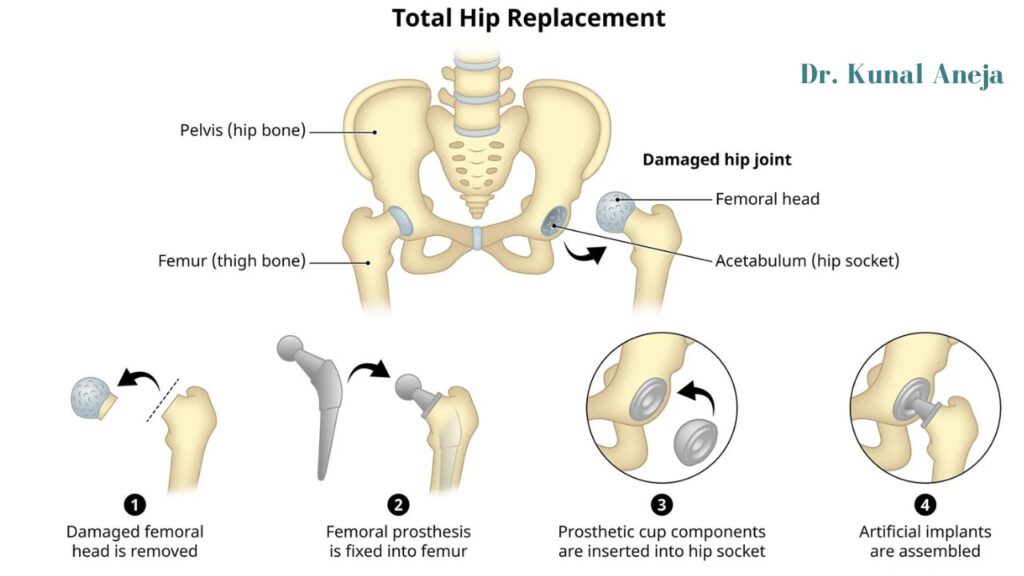
What does the hip replacement procedure involve?
The hip replacement procedure, also known as total hip arthroplasty, involves several essential steps to restore function and alleviate pain in the hip joint. Here is a systematic overview of the procedure:
- Preoperative assessment: Before the surgery, Dr Kunal Aneja will conduct a thorough examination and review your medical history, imaging tests, and overall health to ensure you are prepared for the procedure.
- Anaesthesia: You will receive anaesthesia to ensure a pain-free experience during the surgery. Options may include general or regional anaesthesia, such as epidural or spinal anaesthesia.
- Incision: Dr Kunal Aneja will incision over the hip joint to access the damaged joint surfaces.
- Hip joint preparation: The damaged cartilage and bone in the hip joint are carefully removed to create space for the artificial components.
- Implant placement: The artificial joint components, including the metal socket and a stem with a ball, are securely implanted into the hip bone.
- Closure: The incision is closed with sutures or staples, and a sterile dressing is applied.
- Postoperative care: After the surgery, you will be closely monitored in a recovery area and transferred to a hospital room. Physical therapy and pain management will be initiated to support your healing and rehabilitation.
Remember, this is a general overview, and the specifics of the procedure may vary based on individual circumstances. Dr Kunal Aneja will provide personalized care and guidance throughout the hip replacement procedure to ensure optimal results and a smooth recovery.

How does Hip Replacement Surgery alleviate pain and improve mobility?
Hip replacement surgery effectively alleviates pain and improves mobility through several key mechanisms:
- Resurfacing damaged joint: The procedure involves replacing the hip joint’s damaged cartilage and bone surfaces with artificial components, such as a metal socket and a ball. This eliminates the source of pain caused by osteoarthritis, rheumatoid arthritis, or hip fractures.
- Enhanced joint function: The artificial components used in hip replacement surgery mimic the natural structure of the hip joint, allowing for smoother movement and improved joint function. This results in reduced friction, increased stability, and improved range of motion.
- Reduced inflammation: Inflamed tissues surrounding the damaged hip joint contribute to pain and stiffness. Hip replacement surgery reduces inflammation by removing the damaged joint and replacing it with artificial components, leading to significant pain relief.
- Strengthening supporting muscles: Following surgery, physical therapy and rehabilitation play a crucial role in strengthening the muscles surrounding the hip joint. This aids in stability, balance, and overall improved mobility.
Through these combined effects, hip replacement surgery enables patients to regain pain-free movement, perform daily activities with greater ease, and experience an enhanced quality of life. Dr Kunal Aneja’s expertise ensures the surgery is tailored to each patient’s unique needs, optimizing pain relief and long-term mobility improvement.
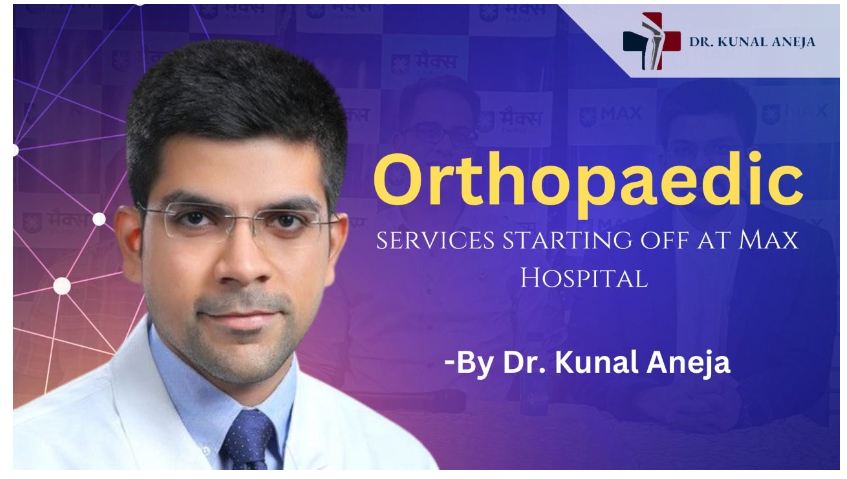
What are the benefits and risks of hip replacement surgery?
Hip replacement surgery offers numerous benefits while also carrying certain risks. Here is a systematic overview of the benefits and risks involved:
Benefits:
- Pain relief: One of the primary benefits of hip replacement surgery is significant pain reduction, allowing individuals to resume daily activities without constant discomfort.
- Improved mobility and function: By replacing the damaged joint, hip replacement surgery restores mobility, range of motion, and overall joint function, enabling patients to engage in activities they were previously unable to enjoy.
- Enhanced quality of life: Relief from chronic pain and improved mobility contribute to an overall improved quality of life, allowing individuals to regain independence and participate in social and recreational activities.
Risks:
- Infection: As with any surgical procedure, there is a risk of infection at the surgical site. Strict adherence to sterile techniques and appropriate antibiotic use minimizes this risk.
- Blood clots: Surgery can increase the risk of blood clots forming in the legs (deep vein thrombosis) or travelling to the lungs (pulmonary embolism). Preventive measures such as blood thinners and early mobilization are implemented to mitigate this risk.
- Implant complications: While rare, complications related to the artificial implant, such as dislocation, wear, or loosening, can occur. Advanced implant materials and adherence to surgical techniques minimize these risks.
- Anaesthetic risks: Anesthesia carries potential risks, such as allergic reactions or adverse heart or respiratory system effects. Anesthesiologists closely monitor patients during surgery to minimize these risks.
Discussing the benefits and risks specific to your case with Dr Kunal Aneja is crucial. As a highly experienced orthopaedic surgeon, he will provide personalized guidance, explain potential risks, and ensure that you are well-informed when making decisions regarding your treatment.
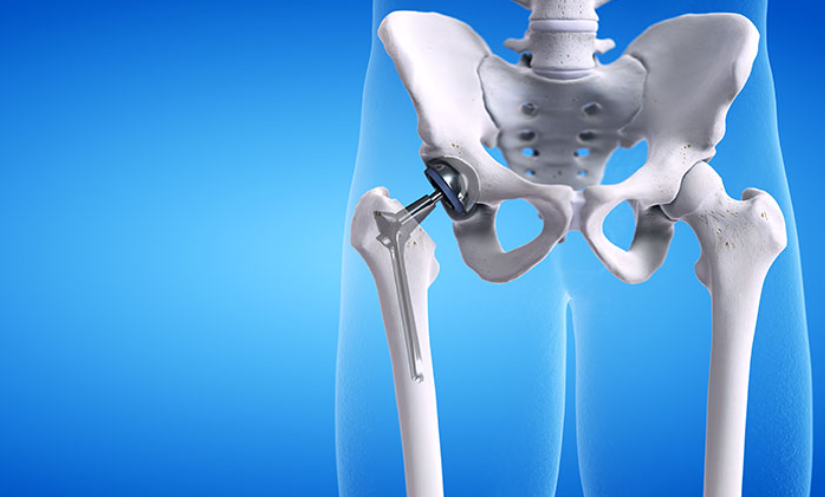
How Should I Prepare for Hip Replacement Surgery?
Preparing for hip replacement surgery is crucial to ensure a smooth, successful procedure and recovery. Here are some important steps to take when preparing for hip replacement surgery:
- Medical Evaluation: Dr Kunal Aneja, a leading orthopaedic surgeon specializing in Hip replacement surgery in Delhi, will conduct a comprehensive medical evaluation to assess your overall health and fitness for surgery. This evaluation may include blood tests, imaging scans, and an examination of your medical history.
- Preoperative Education: Dr Kunal Aneja and his team will provide you with detailed information about the procedure, including what to expect before, during, and after surgery. They will address any concerns or questions and provide instructions on medication management, dietary restrictions, and preoperative exercises.
- Lifestyle Adjustments: It’s essential to make certain lifestyle adjustments before hip replacement surgery. These may include weight management, smoking cessation, and nutrition optimization to support healing.
- Medication Management: Dr Kunal Aneja will review your current medications and provide guidance on which ones to continue or discontinue before the surgery. You may need to adjust or temporarily stop certain medications, such as blood thinners, to minimize the risk of complications during the procedure.
- Preparing Your Home: Arrange your living space to ensure a safe and comfortable recovery. This may involve removing tripping hazards, securing handrails, and placing essential items within easy reach.
- Support System: Coordinate assistance from family members, friends, or caregivers to help you during recovery. They can assist with transportation, household chores, and emotional support.
By following Dr Kunal Aneja’s guidance and diligently preparing for hip replacement surgery, you can optimize your chances of a successful outcome and a faster recovery. Remember to discuss any specific concerns or questions you may have with Dr Aneja during your consultations. Choosing the right surgeon, such as Dr Kunal Aneja, ensures that you receive the best care and expertise in Hip replacement surgery in Delhi.

What can you expect during rehabilitation and recovery after hip replacement surgery?
Rehabilitation and recovery after hip replacement surgery are vital in achieving optimal outcomes. Here is a systematic overview of what you can expect during this crucial phase:
- Hospital stay: Following the surgery, you typically stay there for a few days for close monitoring and initial recovery. Pain management, wound care, and physical therapy will be initiated during this time.
- Physical therapy: Physical therapy is an integral part of hip replacement recovery. A physical therapist will guide you through exercises and movements to gradually regain strength, flexibility, and mobility in the hip joint. Therapy may continue on an outpatient basis after discharge.
- Assistive devices: Initially, you may require assistive devices like crutches or a walker to support walking and maintain stability. As your strength improves, you will transition to using a cane and eventually regain independent walking.
- Gradual return to activities: Your surgeon will provide guidelines on when to resume daily activities, such as driving, working, and participating in recreational activities. The timeline for recovery varies for each individual but typically ranges from several weeks to a few months.
- Follow-up appointments: Regular follow-up appointments with Dr Kunal Aneja will be scheduled to monitor your progress, assess healing, and make any necessary adjustments to your rehabilitation plan.
Remember, rehabilitation and recovery timelines can vary based on individual factors, such as overall health, age, and adherence to the recommended exercises and lifestyle modifications. By actively participating in the rehabilitation process and following the guidance of Dr Kunal Aneja and the physical therapist, you can expect to regain mobility, strength, and a fulfilling, pain-free life.
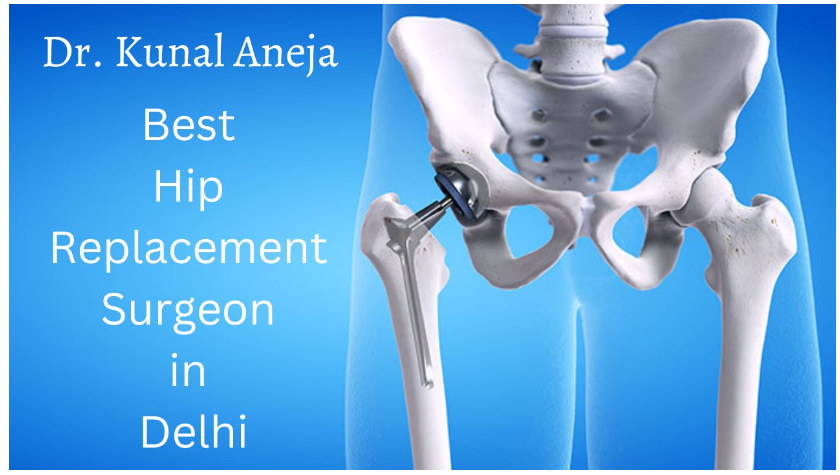
Why is Dr Kunal Aneja the trusted expert in hip replacement surgery?
Dr Kunal Aneja is widely regarded as the trusted expert in hip replacement surgery for several compelling reasons:
- Extensive experience: With years of experience in orthopaedic surgery, Dr Kunal Aneja has performed numerous successful hip replacement procedures. His wealth of knowledge and refined surgical skills ensure that patients receive the highest expertise and care.
- Advanced techniques: Dr Kunal Aneja stays at the forefront of advancements in hip replacement surgery. He employs cutting-edge techniques and state-of-the-art technology to provide patients with the most innovative and effective treatment options.
- Personalized approach: Dr Kunal Aneja understands that each patient’s condition is unique. He takes the time to listen to patients, thoroughly assess their needs, and develop tailored treatment plans. His compassionate approach ensures patients feel heard, supported, and confident in their care.
Exceptional outcomes: Dr Kunal Aneja’s track record of successful patient outcomes speaks for itself. His commitment to excellence and attention to detail
4. result in remarkable improvements in pain relief, mobility, and overall quality of life for his patients.
5.Patient satisfaction: Countless satisfied patients attest to Dr Kunal Aneja’s expertise and the exceptional care they received. Testimonials and positive reviews highlight his compassionate bedside manner, clear communication, and dedication to patient satisfaction.
When choosing a surgeon for hip replacement surgery, Dr Kunal Aneja’s reputation as a trusted expert and his commitment to delivering personalized, innovative, and successful outcomes make him the preferred choice for individuals seeking the best possible care in Delhi.

How Does Dr. Kunal Aneja Approach Hip Replacement Surgery?
Dr Kunal Aneja, a renowned orthopedic surgeon specializing in hip replacement surgery in Delhi, follows a comprehensive and patient-centred approach to ensure optimal outcomes. Here’s an overview of how Dr Aneja approaches hip replacement surgery:
- Thorough Evaluation: Dr Kunal Aneja begins by conducting a detailed evaluation of the patient’s condition, considering their medical history, imaging scans, and physical examination. This assessment helps him determine the most suitable treatment plan tailored to the patient’s needs.
- Individualized Treatment Plan: Dr Aneja believes in personalized care and develops an individualized treatment plan for each patient. He considers factors such as age, lifestyle, activity level, and overall health to determine the most appropriate type of hip replacement and surgical approach.
- Advanced Surgical Techniques: Dr Kunal Aneja is extensively trained in advanced techniques, including robotic-assisted and minimally invasive hip replacement surgery. These techniques allow precise implant placement, reduced tissue trauma, and faster recovery.
- Multidisciplinary Approach: Dr Aneja works closely with a multidisciplinary team of healthcare professionals, including physiotherapists and pain management specialists, to ensure comprehensive care throughout the patient’s journey.
- Patient Education and Empowerment: Dr Kunal Aneja prioritizes patient education and ensures his patients fully understand the procedure, risks, benefits, and expected outcomes. He encourages active patient participation in decision-making, empowering them to make informed choices about their healthcare.
- Postoperative Care and Rehabilitation: Dr Aneja emphasizes the importance of postoperative care and rehabilitation. He provides detailed instructions on postoperative exercises, physical therapy, and pain management techniques to facilitate a smooth recovery and maximize long-term outcomes.
Dr Kunal Aneja’s approach to hip replacement surgery combines his expertise, advanced techniques, and patient-centred care to deliver outstanding results. His commitment to individualized treatment and comprehensive support sets him apart as a leading hip replacement surgeon in Delhi.

Are there alternatives to hip replacement surgery?
While hip replacement surgery is a highly effective treatment option, some alternatives can be considered based on the specific condition and individual circumstances. Here are some alternative treatments to explore:
- Medications: Nonsteroidal anti-inflammatory drugs (NSAIDs), pain relievers, and corticosteroids may temporarily relieve hip pain and inflammation. These medications can be used to manage symptoms, particularly in milder cases.
- Physical therapy: A customized physical therapy program can help strengthen the muscles surrounding the hip joint, improve the range of motion, and alleviate pain. Therapeutic exercises, manual therapy, and heat or cold therapy may be utilized.
- Injections: Corticosteroid injections or viscosupplementation injections (hyaluronic acid) can temporarily relieve inflammation and lubricate the joint. These injections may be recommended for individuals with mild to moderate hip arthritis.
- Assistive devices: Walking aids such as canes, crutches, or walkers can assist in reducing weight-bearing on the hip joint and improving mobility.
- Lifestyle modifications: Weight management, regular low-impact exercise, and modifications in daily activities can help alleviate stress on the hip joint and improve symptoms.
It’s important to consult with Dr Kunal Aneja to discuss these alternatives and determine the most appropriate treatment plan based on your specific condition and needs. While these alternatives may provide temporary relief, hip replacement surgery may still be the best long-term solution for severe pain or advanced hip conditions.
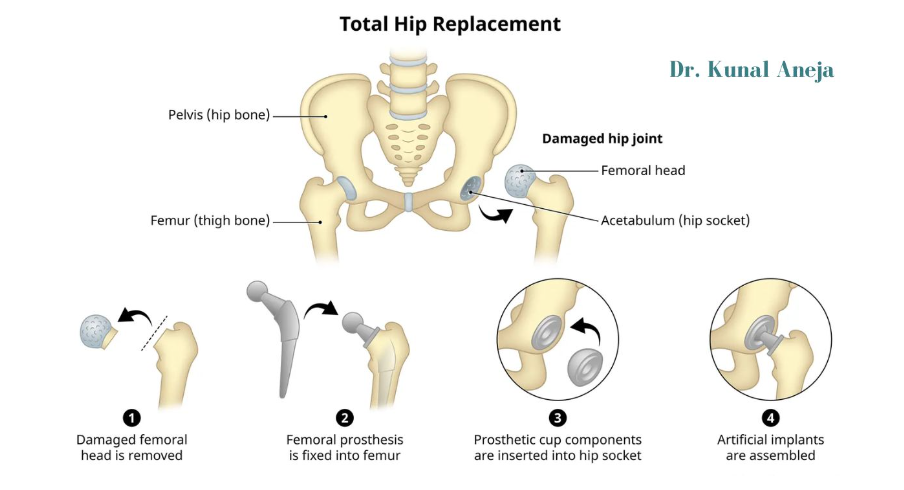
Why is it important to choose a trusted surgeon for hip replacement?
Choosing a trusted surgeon for hip replacement is paramount for several important reasons:
- Expertise and experience: A trusted surgeon, such as Dr Kunal Aneja, brings extensive experience and specialized knowledge to the table. Their expertise in hip replacement surgeries ensures higher skill, precision, and familiarity with complex cases, leading to better surgical outcomes.
- Safety and reduced complications: A trusted surgeon follows stringent safety protocols, adheres to the latest surgical techniques, and operates in state-of-the-art facilities. This minimizes the risk of complications during and after the procedure, promoting a safer surgical experience.
- Personalized care: A trusted surgeon understands the significance of personalized care. They take the time to listen to patients, address their concerns, and tailor treatment plans according to individual needs. This compassionate approach fosters trust, confidence, and a sense of security throughout the surgical journey.
- Comprehensive postoperative support: A trusted surgeon like Dr Kunal Aneja provides comprehensive postoperative care, including regular follow-up
- appointments, physical therapy, and rehabilitation guidance. This ensures a smooth recovery process and maximizes the potential for optimal long-term results.
- Patient satisfaction and testimonials: A trusted surgeon’s track record of patient satisfaction is a testament to their skills, professionalism, and patients’ positive experiences. Patient testimonials and reviews provide valuable insights into the quality of care, fostering trust and confidence in their abilities.
Ultimately, choosing a trusted surgeon for hip replacement is vital to ensure the best possible surgical outcomes, minimize risks, and receive the highest personalized care throughout the treatment journey.

What Can I Expect During My Initial Consultation with Dr Kunal Aneja?
You can expect a thorough and personalized evaluation during your initial consultation with Dr Kunal Aneja, a highly experienced orthopedic surgeon specializing in Hip replacement surgery in Delhi. Here’s what you can anticipate during your consultation:
- Medical History Review: Dr Aneja will begin by reviewing your medical history, including any previous injuries, surgeries, or existing medical conditions that may impact your hip health.
- Physical Examination: A comprehensive physical examination will focus on your hip joint and surrounding areas. This examination helps Dr Aneja assess the extent of your hip condition and determine the most appropriate treatment approach.
- Diagnostic Tests: Depending on your specific case, Dr Kunal Aneja may request imaging tests such as X-rays, MRIs, or CT scans to obtain detailed images of your hip joint and confirm the diagnosis.
- Discussion of Symptoms and Concerns: This is an opportunity to discuss your symptoms, pain levels, limitations, and concerns about your hip condition. Dr Aneja will actively listen and address any questions you may have.
- Treatment Options: Based on the evaluation, Dr Kunal Aneja will discuss the various treatment options available for your hip condition. He will explain each option’s benefits, risks, and expected outcomes, allowing you to make an informed decision.
- Individualized Treatment Plan: Dr Aneja will work closely with you to develop an individualized treatment plan tailored to your needs, considering factors such as age, lifestyle, and overall health. The plan may involve conservative management, physical therapy, or surgical intervention such as hip replacement.
- Addressing Concerns: Dr Aneja will address any concerns or questions you may have, providing clear explanations and guidance throughout the consultation.
By the end of your initial consultation with Dr Kunal Aneja, you can expect to have a comprehensive understanding of your hip condition, the available treatment options, and a personalized plan for moving forward. Dr Aneja’s expertise, compassionate approach, and commitment to patient care ensure you receive the best guidance and support for your hip-related concerns.

What support does Dr Kunal Aneja provide throughout the hip replacement journey?
Throughout the hip replacement journey, Dr Kunal Aneja provides comprehensive support to his patients, ensuring their comfort and successful recovery. Here’s a breakdown of the support he offers:
- Preoperative guidance: Dr Kunal Aneja offers detailed consultations to discuss the procedure, answer questions, and address concerns. He educates patients about what to expect, including preoperative preparations and anaesthesia options.
- Personalized treatment plans: Each patient receives a tailored treatment plan based on their condition, medical history, and lifestyle. Dr Kunal Aneja considers individual needs and preferences to ensure the best possible outcome.
- State-of-the-art facilities: Dr Kunal Aneja operates in advanced medical facilities with the latest technology and equipment. This ensures optimal surgical precision, safety, and efficiency.
- Skilled surgical techniques: Dr Kunal Aneja utilizes advanced techniques that minimize tissue damage, reduce pain, and accelerate healing. These techniques contribute to shorter hospital stays and faster recovery.
- Postoperative care: Dr Kunal Aneja and his team provide attentive postoperative care, monitoring patients closely for any complications and ensuring a smooth recovery. They offer guidance on pain management, rehabilitation exercises, and lifestyle modifications for long-term success.
- Follow-up appointments: Dr Kunal Aneja schedules regular follow-up appointments to track the progress of his patients. These appointments allow for ongoing evaluation, addressing any concerns, and making necessary adjustments to the recovery plan.
- Emotional support: Recognizing the emotional impact of surgery, Dr Kunal Aneja and his team provide compassionate care, offering reassurance, empathy, and encouragement throughout the journey.
With Dr Kunal Aneja’s comprehensive support, patients can feel confident and supported during their hip replacement journey, leading to a successful outcome and improved quality of life.

Conclusion
Hip replacement surgery can be life-changing for individuals suffering from chronic hip pain. With Dr Kunal Aneja’s expertise, compassion, and commitment to excellence, you can trust that you are in the best hands. Regain your mobility, eliminate pain, and embrace a more active lifestyle. Take the first step towards a pain-free future by scheduling a consultation with Dr Kunal Aneja today
FAQs
The recovery process after hip replacement surgery typically takes several weeks, with most patients able to resume normal daily activities within 3 to 6 months, depending on individual factors.
There are different types of hip replacements available, including traditional total hip replacement, minimally invasive hip replacement, and hip resurfacing, with Dr Kunal Aneja selecting the most suitable option based on each patient’s unique condition and needs.
Yes, in certain cases, hip replacement surgery can be performed on both hips simultaneously, providing patients with the advantage of a single surgical procedure, coordinated recovery, and a faster return to an active lifestyle.
While recovery timelines vary, most patients can gradually resume light activities within a few weeks after surgery, with a gradual increase in activity levels as guided by Dr Kunal Aneja and the rehabilitation team.
Most hip replacement patients report significant pain alleviation, increased mobility, and improved quality of life. Excellent results for his patients are a result of Dr Kunal Aneja’s experience and systematic approach.

